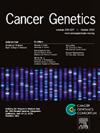Machine learning analysis of CD4+ T cell gene expression in diverse diseases: insights from cancer, metabolic, respiratory, and digestive disorders
IF 2.1
4区 医学
Q4 GENETICS & HEREDITY
引用次数: 0
Abstract
CD4+ T cells play a pivotal role in the immune system, particularly in adaptive immunity, by orchestrating and enhancing immune responses. CD4+ T cell-related immune responses exhibit diverse characteristics in different diseases. This study utilizes gene expression analysis of CD4+ T cells to classify and understand complex diseases. We analyzed the dataset consisting of samples from various diseases, including cancers, metabolic disorders, circulatory and respiratory diseases, and digestive ailments, as well as 53 healthy controls. Each sample contained expression data for 22,881 genes. Four feature ranking algorithms, incremental feature selection method, synthetic minority oversampling technique, and four classification algorithms were utilized to pinpoint essential genes, extract classification rules and build efficient classifiers. The following analysis focused on genes across rules, such as AK4, CALU, LINC01271, and RUSC1-AS1. AK4 and CALU show fluctuating levels in diseases like asthma, Crohn's disease, and breast cancer. The analysis results and existing research suggest that they may play a role in these diseases. LINC01271 generally has higher expression in conditions including asthma, Crohn's disease, and diabetes. RUSC1-AS1 is more expressed in chronic diseases like asthma and Crohn's, but less in acute illnesses like tonsillitis and influenza. This highlights the distinct roles of these genes in different diseases. Our approach highlights the potential for developing novel therapeutic strategies based on the transcriptional profiles of CD4+ T cells.
不同疾病中CD4+ T细胞基因表达的机器学习分析:来自癌症、代谢、呼吸和消化系统疾病的见解。
CD4+ T细胞在免疫系统中发挥关键作用,特别是在适应性免疫中,通过协调和增强免疫反应。CD4+ T细胞相关免疫反应在不同疾病中表现出不同的特点。本研究利用CD4+ T细胞基因表达分析对复杂疾病进行分类和认识。我们分析了由各种疾病样本组成的数据集,包括癌症、代谢紊乱、循环和呼吸系统疾病、消化系统疾病,以及53个健康对照。每个样本包含22,881个基因的表达数据。利用4种特征排序算法、增量特征选择法、合成少数派过采样技术和4种分类算法,精确定位特征基因,提取分类规则,构建高效分类器。下面的分析集中在跨规则的基因上,如AK4、CALU、LINC01271和RUSC1-AS1。AK4和CALU在哮喘、克罗恩病和乳腺癌等疾病中表现出波动的水平。分析结果和现有研究表明,它们可能在这些疾病中发挥作用。LINC01271通常在哮喘、克罗恩病和糖尿病等疾病中表达较高。RUSC1-AS1在哮喘和克罗恩病等慢性疾病中表达较多,但在扁桃体炎和流感等急性疾病中表达较少。这突出了这些基因在不同疾病中的不同作用。我们的方法强调了开发基于CD4+ T细胞转录谱的新治疗策略的潜力。
本文章由计算机程序翻译,如有差异,请以英文原文为准。
求助全文
约1分钟内获得全文
求助全文
来源期刊

Cancer Genetics
ONCOLOGY-GENETICS & HEREDITY
CiteScore
3.20
自引率
5.30%
发文量
167
审稿时长
27 days
期刊介绍:
The aim of Cancer Genetics is to publish high quality scientific papers on the cellular, genetic and molecular aspects of cancer, including cancer predisposition and clinical diagnostic applications. Specific areas of interest include descriptions of new chromosomal, molecular or epigenetic alterations in benign and malignant diseases; novel laboratory approaches for identification and characterization of chromosomal rearrangements or genomic alterations in cancer cells; correlation of genetic changes with pathology and clinical presentation; and the molecular genetics of cancer predisposition. To reach a basic science and clinical multidisciplinary audience, we welcome original full-length articles, reviews, meeting summaries, brief reports, and letters to the editor.
 求助内容:
求助内容: 应助结果提醒方式:
应助结果提醒方式:


